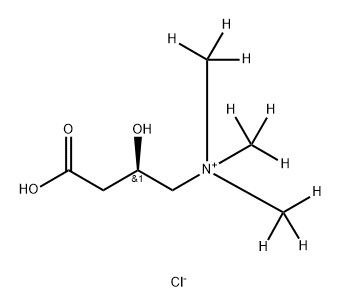L-Carnitine-d9 is intended for use as an internal standard for the quantification of L-carnitine by GC- or LC-MS. L-Carnitine is a conditionally essential nutrient.1 It is obtained from dietary sources or through the metabolism of lysine and methionine.2,3 L-Carnitine facilitates the transport of long-chain fatty acids into the mitochondrial matrix for β-oxidation, has other diverse roles on metabolism, and is involved in the maintenance of coenzyme A stores. Plasma and/or tissue levels of L-carnitine are decreased in primary L-carnitine deficiency, a disorder characterized by impaired fatty acid oxidation, with symptoms varying depending on whether it is systemic or muscle-specific.1 Serum and tissue levels of L-carnitine are also reduced in secondary L-carnitine deficiencies caused by a variety of hereditary defects or acquired disorders.
1.Seim, H., Eichler, K., and Kleber, H.-P.L(-)-Carnitine and its precursor, γ-butyrobetaineNutraceuticals in Health and Disease Prevention217-256(2001)
2.Vaz, F.M., and Wanders, R.J.A.Carnitine biosynthesis in mammalsBiochem. J.361(Pt 3)417-429(2002)
3.Fu, L., Huang, M., and Chen, S.Primary carnitine deficiency and cardiomyopathyKorean. Circ. J.43(12)785-792(2013)
